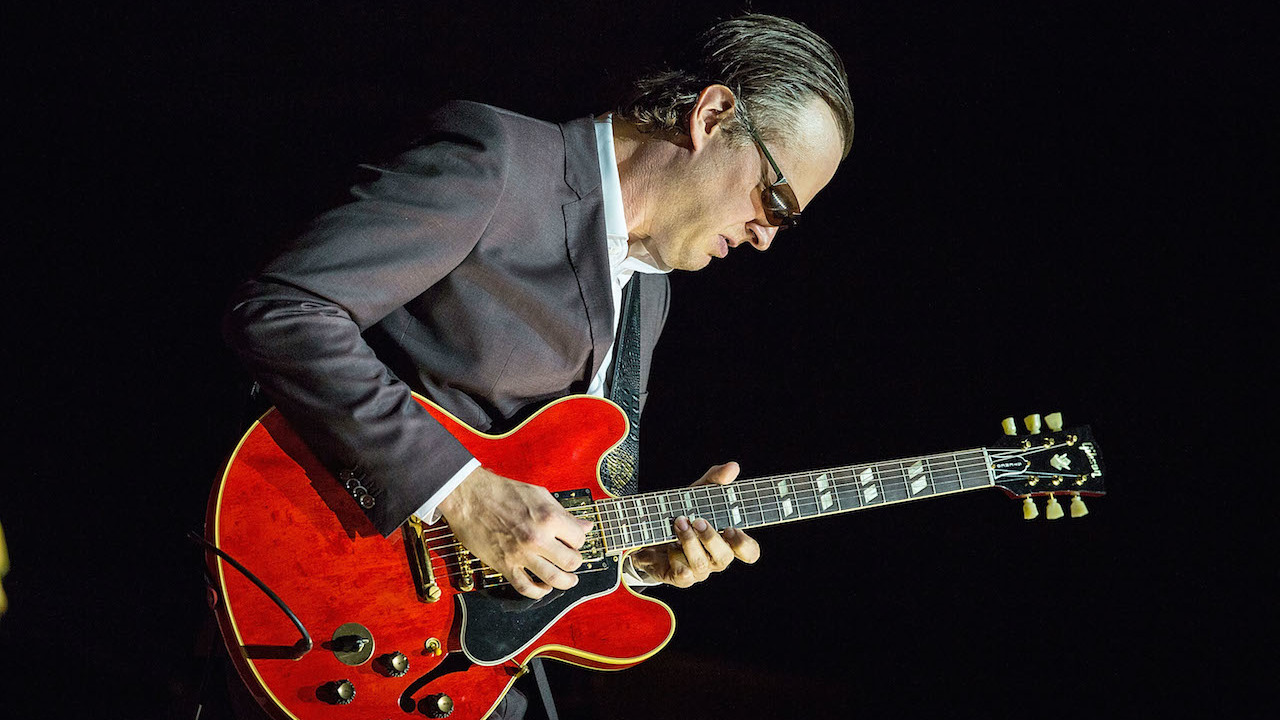This article first appeared in The Blues #5, February 2013.
Joe Bonamassa is always tickled to read about the antics of his evil twin. By this, we mean the fictional Bonamassa dreamt up by internet trolls in dark corners of blues forums; the Bonamassa who spends his time tearing into merch girls, barking orders from a sedan chair and berating his troupe of serving-dwarves for fanning him with the wrong ostrich feather.
“I mean, some of these cats are creative,” says the bluesman, mock-impressed. “I gotta give it up for the creativity. To come up with this fantasy land. The best one was that, according to ‘inside sources’, when I was touring with Black Country Communion, I would relegate the other band members into one small dressing-room, while I took two. I wound the crew up with my outrageous demands, and was a tyrant for nine weeks.”
He gapes: “And the guy was dead serious about it! And so you say to yourself, what ‘inside source’? The reality is, backstage, you’ll find me sat in a small room, with six Diet Cokes and Red Bulls, maybe a computer or an iPad, looking for guitars online. You can ask anybody on my crew. It’s the most mundane, un-rock‘n’roll hang ever. It’s like a retirement party back there.
“But these people who post negative stuff about you,” he sighs, “they just make shit up. This was on some forum, and of course, then it goes viral and people make judgements about you. You just go, ‘What in the world inspires someone to make something like that up in their heads?’ What it is – and I figured this out – is it’s really like a new Darwinism. It’s like the survival of the fittest, but on the internet, it’s the survival of the meanest. Your core fans and the people who truly know you, they’ll read that stuff and they know it’s just absolute fantasy. But it’s the ones who go, ‘Well, yeah, I’ve heard of him, and see, he’s an asshole’. There’s always gonna be that level of absolute fiction. I don’t even know how to respond.”
Our apologies if this seems a negative tack on which to start a cover interview. The fact is that when The Blues calls Bonamassa at home in LA, the subject of a backlash keeps coming up – not least because he’s on the promotional trail for an album he fears “could go down like a lead balloon”. Perhaps Mr Blues is right to be worried. That love/hate polarity isn’t just online. You can feel the Bonamassa battle-lines drawn in the clubs, on the streets, in the love letters and poison-pen diatribes that fire into our mailbox.
“The backlash?” Bonamassa echoes. “It’s already started. There already is one. There has been one forever. I’m probably one of the most argued-about players. For every one person that sings your praises, there’s somebody else on some forum who will post something to the contrary. But at the end of the day, it’s all part of the game. And that’s not just me, it goes for everybody in the business, or anybody who has enjoyed a little bit of notoriety. You’re never gonna be universally liked.”
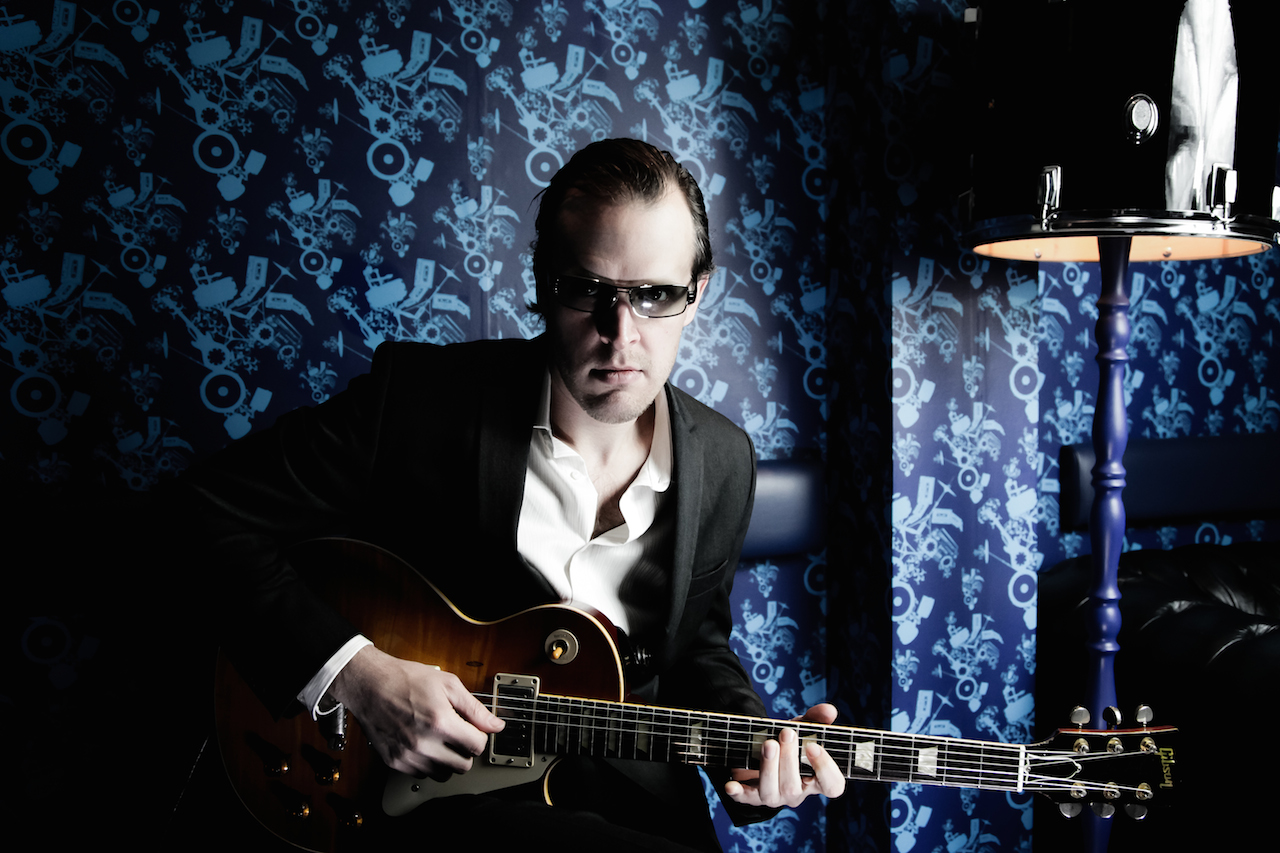
We should stress, the statistics prove beyond doubt the ‘pro’ camp is winning: the venues are getting bigger, the suits better-cut, the magazine features more lavish and the chart placings higher, with last year’s Driving Towards The Daylight a career-best UK No.2 (pipped by Emeli Sandé, of all people). The modern blues king ain’t about to be dethroned.
And yet, there have been sleeve-mutterings, even among those who broadly term themselves ‘fans’, that Bonamassa is in danger of saturating his market, spreading himself too thin. The statistics back that up, too. As a solo artist, in Black Country Communion and alongside the spirited soul singer Beth Hart, he’s put out a total of eight studio albums in the past four years (to discount the myriad live releases and axe-for-hire cameos with acts as disparate as Europe and Henrik Freischlader). He’s a man in motion; a pathological pie-fingerer; a studio junkie looking for his next fix. Like a shark, you sense that if Bonamassa ever stops swimming, he’ll die.
The point is hilariously illustrated today, when we praise Bonamassa’s talking-head appearance on the BB King documentary, The Life Of Riley, only to find him non-plussed, apparently so dizzy with projects and press that he wasn’t even aware he contributed. “Am I in that?” he asks, wracking his brain. “You know, with a lot of this [press] stuff, they bring in cameras, because they do multipurpose filming, and everybody asks me about BB King, so you end up talking ’til you’re blue in the face and don’t even know what it’s for. I really should pay attention. Well, I’m honoured…”
All over the scene like a rash, then, but even the trolls would struggle to form a pub argument that Bonamassa is simply churning ‘em out. From his unfussy, blues-breaking pre-millennial roots, through 2007’s acoustic-leaning Sloe Gin, to the well-judged world-music flavours of 2010’s Black Rock, he’s actually risked tearing up his meal-ticket at every juncture, rather contrary to the sneered theories that he’s a dead-eyed careerist mass-producing hay while the sun shines.
Refreshingly, it’s a tradition that continues with the Live In Vienna CD/DVD capturing the 22-song acoustic set recorded last July at the Austrian capital’s opera house, where this electric warrior fully expected to fall on his arse. “It really is Kryptonite to me, the acoustic guitar,” he mutters. “It wears you out after a while. So it was like, ‘This could either go down really well… or else we’re really screwed here.’”
- Q&A: Joe Bonamassa
- Beth Hart: Soul Survivor
- BB King: the life of riley
- First Time I Met The Blues: Glenn Hughes
Risky or not, it was a five-year itch that needed to be scratched. “Kevin Shirley [long-time producer] and I were talking about this going right back to the album Sloe Gin,” he recalls. “That record originally started as an acoustic album, and finished up as kind of a hybrid. Kevin and I kept the thought in the backs of our minds to do something on acoustic guitar, but to me, to sit in the studio and light the candles… it’d lack a bit of fire. In my mind, the fire is gonna come when you’re responding to a crowd.
“So we had this opportunity last year,” he continues. “The people who book the Jazz Fest at the Vienna Opera House – who had inexplicably booked Black Country Communion – approached us about doing something special there. So we knew we had this date over the summer, on hold, to do anything we wanted. We could have just brought the electric band, I could have had a dance troupe with Michael Flatley, it didn’t matter.”
What they came up with was almost as suicidal.
“It was like, ‘Hey, why don’t we finally do this acoustic thing that we talked about all the way back then?’” Bonamassa explains. “My original idea was me sitting in a chair, surrounded by guitars, telling stories about the songs, just me on my tod, nobody else. Kevin looked at me, and he goes, ‘No offence to you personally, but just talking about that bores me’. I was like, ‘Fair enough’.
“So then it was, like, how about we get a guy to play traditional Irish fiddle and mandolin, and maybe a percussion player who has a real ‘world’ feel? Maybe we should get a right-field instrument, something that not everybody has heard of. And then maybe we get keyboards, but not in a traditional sense. And maybe we have accordions, glockenspiels, a utility guy… all of a sudden, it all kinda came together.”
Bonamassa didn’t transform his songbook beyond recognition, à la Unplugged’s Layla, but he’s certainly bent it out of shape. “Kevin and I sat in the studio for about four hours,” he recalls of choosing the set.
“I thought we weren’t going to be able to do songs like John Henry; I thought the riffier stuff was gonna go out of the window. I had this weird idea to do [Tom Waits’s] Jockey Full Of Bourbon. And the day before the first show, we were at a meet-and-greet at this music store in Vienna; y’know, I’m there to sign autographs, put my hands in some clay and geek out with the dudes. When we’re all done, Kevin goes, ‘Joe, check this out’, grabs two mallets and starts playing the melody to Sloe Gin on this glockenspiel-looking device. That was the day before the first gig. So we didn’t sit and woodshed it for months. There was no time for that.”
All he had was an ethos. “You know, I watched MTV Unplugged as a kid, and those things were a definite lesson on what to do and what not to do,” he reflects. “Eric Clapton nailed it with the Unplugged album; I mean, he was arguably the best of all, and that was one of his pivotal records of the past 30 years. And then there’s the other bands, who just decided to go, ‘Hey, let’s just play it like we do in the arenas, with rubberband-sounding guitars’, and you’re going, ‘Uh-oh, that’s not exactly my idea of a good time’. I remember Stevie Ray Vaughan did a great Pride And Joy, where he was such a powerful musician that he could just come out with a Guild 12-string, like a Chris Whitley sort of situation, where a guy makes so much music with one guitar that he doesn’t need anybody to back him up. So when we started talking, we said, ‘Listen, let’s do this old school, nothing is allowed to be plugged in’. Which presented a huge challenge for the crew, because now you have 27 open mics onstage, and it just can’t get that loud.
“So we put this thing together in three days,” he continues. “We showed up in Vienna and rehearsed in this huge sound stage where they shoot movies. I’d obviously met [multi-instrumentalist] Arlan Schierbaum and [percussionist] Lenny Castro before, but the two other guys, Mats Wester and Gerry O’Connor, I’d never met. But it was like, we had 72 hours before the first gig, so it was just, ‘Hi, nice to meet you, thanks for doing this’. And honestly, it was the most fulfilling musical experience of my life, from day one to the very end. Nobody wanted it to end.”
It takes balls to work that fast, doesn’t it?
“Well,” considers Bonamassa. “I would say that what starts bad ends bad, and what starts good ends good, y’know? The intention was right, and the first couple of tunes we ran through, it just kinda glued itself together and I knew we had the right band. The middle of day two, my voice started to give out, because I was finding it such a heavy burden to sing in that frequency. It’s like, normally, I’ll do 17 or 18 tunes a night, and I do sing, but there’s a break for a two-minute guitar solo and you don’t realise how much that affects your stamina. So we had to cut the rehearsal halfway through the second day, because I said, ‘There won’t be a third day if we keep going’. Had a good night’s sleep, recovered, sang again, ran through it all, then had a pretty big soundcheck at our first gig.”
It would have prudent, you might think, to iron out the kinks at a low-key, last-minute club gig. “Actually, our first date was Montreux Jazz,” grins Bonamassa. “For the first three songs the crowd went crazy and I just thought ‘Thank God’. It may have been a little loose, but the spirit was there, and I’d rather have spirit than be note-perfect and flat. So that’s how it went down. We did seven shows and the first couple we were a little shaky, made a few mistakes, but by the time we hit Vienna, we knew the arrangements and chords and thank God, that was when the cameras showed up. The DVD came out great, but you can see the challenge it was for me as a singer.”
As the Live In Vienna releases testify, that night in Austria was a well-received triumph, pushing this consummate professional out of his comfort zone, but never into the ditch. Still, that was in front of a home crowd of non-haters. There will be those, we suggest, who will read Live In Vienna as final evidence that the 35-year-old has drifted irredeemably from his vital, lead-in-pencil, blues-rocking early releases – Blues Deluxe, let’s say, or Taking The Hit – to a tame, wicker-chaired brand of comfortably-seated campfire rock.
“You know what?” he reasons. “I’ve done three albums with Black Country Communion, and that’s enough rock for me. That really got me to exorcise my rock tendencies. Acoustic blues can absolutely be as powerful as electric, if you play it with the same intensity and fire. A lot of people, you give them an acoustic and for some reason it’s in their DNA to resort to a campfire song. But I mean, look at Woodstock: one of the most powerful performances was Crosby, Stills and Nash doing Suite: Judy Blue Eyes, and that was two acoustic guitars and three voices, and it was as heavy and had as much impact as Hendrix playing the Star Spangled Banner. If you take that kind of approach, it works. If you take the ‘hotel café, let’s see how mellow we can get here’ approach, it may not work out, especially in the context of blues. I had stuff in the back of my mind when we did this thing. Neil Young on Saturday Night Live, when he did that beautiful version of Harvest Moon. I’m a huge fan of Robert Johnson. I love Rory Gallagher’s acoustic bootlegs from the 90s. When I play acoustic, I hear bits of Doc Watson, bits of Ricky Skaggs, bits of Stephen Stills…”
The Vienna cover of Charlie Patton’s High Water Everywhere is particularly powerful, we tell him.
“Well, we first covered that in 2006, when Hurricane Katrina had just happened, and in the US, everything was a flood. And it was just one of those things where you happen to be in a Charlie Patton mood, and you put on a whole record, and all of a sudden, those lyrics just kinda started coming out of the speakers like daggers. I researched the history of the song, and it was about when they blew up the levee, trying to get the sharecroppers out of this land that they wanted. It was almost the same situation, where a levee breaks and then all of a sudden this whole neighbourhood is flooded out and people are dead. I’m not a political guy – at least not publicly – but I was like, ‘Well, that’s a very cool way to say that history sometimes does repeat itself’.
“But I think even more so,” he continues of the acoustic artists that influenced Vienna, “what really got me were guys like Chris Whitley. I mean, he was a one-of-a-kind player, just a hybrid of punk-rock and blues, with Dylan-esque lyrics – but he played it on a dobro. I opened up for him one time in Indianapolis, in front of about 80 people, and it was kinda strange going on before a guy with one dobro. I’d never heard of him, and he got up there and took us out. It was the heaviest display of music I’ve seen in my entire life. I was like, ‘Well, obviously, I was very wrong about this.’”
Likewise, Bonamassa is asking us to suspend our preconceptions for next month’s run of four London shows, held at four disparate venues, from the 200-capacity Borderline to the Royal Albert Hall. As The Blues went to press, he was still ironing out the details, but seemed set on shedding his musical skin each night.
“We’re recording all of those shows, both for DVD and audio,” he explains. “It’s a different band, a different show every night. It’s like, one night will be horns and blues, and another night will be just the three-piece. Maybe the Hammersmith Odeon will be rock, and then the Royal Albert Hall – which will be the end – will probably be the acoustic band, and maybe we’ll get the double-drums out again. So that’s the concept.”
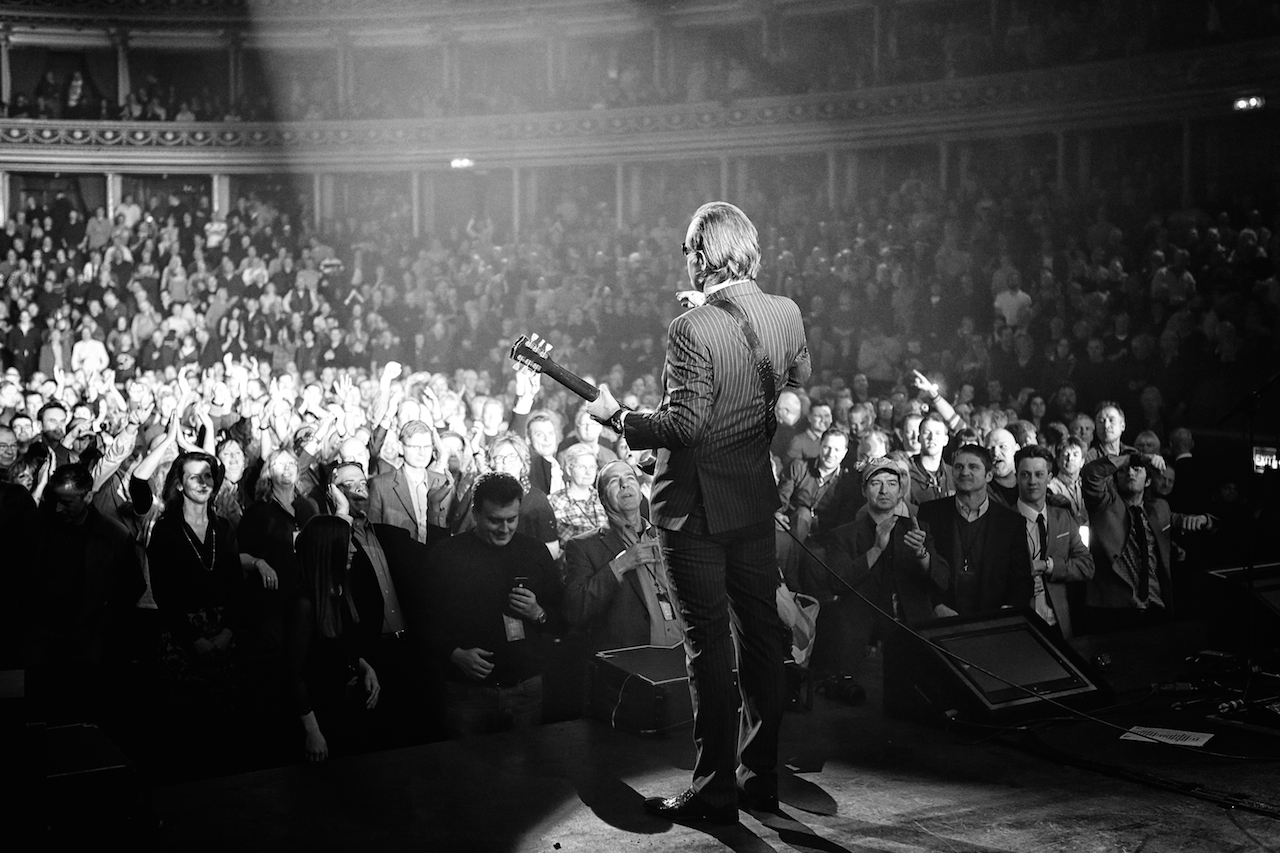
Like we say: not just a man going through the motions. There’s a tantalising whiff of danger about the whole enterprise, even if Bonamassa’s chosen city is predictable, as an unashamed Anglophile who fell for London via the grooves of John Mayall’s Blues Breakers With Eric Clapton.
“I really immersed myself into British culture when I got into British blues,” he recalls. “You know, I wanted to live in London in the 60s; that would have been my ideal point, just to hang. People think I’m British over here, because I buy a lot of my coat collection in London. I’ve been to Savile Row, and Sandi [Thom, girlfriend] has taken me to some of the finer shopping places.
“The Albert Hall speaks for itself,” he continues of the chosen venues. “The fact that we’ve been able to play the Hammersmith Odeon, three or four times now, that’s hallowed ground, especially in the 70s. Everybody played there, from Rory Gallagher to Whitesnake, and back. I mean, when I first came over to the UK, back in 2005, we were playing pub gigs, but they’d ram these little pubs full of people. That was how it all started.”
Culturally, London is quite a change from Los Angeles…
Bonamassa laughs: “LA is a sunny place for shady people. It really is. If you went to Beverly Hills, chances are you will see some really good plastic surgery – and some really bad plastic surgery. But it’s not all like that. There’s a working class that lives out in the Valley, and a lot of my friends are here. I could live anywhere and do this, because I’m not, quote, ‘in the business’. It’s not like I need to be in LA to make the scene.”
On the contrary, it feels like the blues scene revolves around him. Throw in another soul-rock covers album with Beth Hart, plus the inevitable slew of guest spots (“This Thursday, I’m doing a solo for James Cotton’s new album – he was the first professional blues act to ever give me a shot to play onstage with him, when I’d just turned 11.”) and the year ahead sounds like masochistic business as usual for Bonamassa. The whole look-how-hard he-works line of questioning is getting old now, but it’s hard to skim over that work ethic when your subject is yawning and banging the coffee-maker.
“I just got back from South-East Asia and Australia,” sighs Bonamassa of his permanently jetlagged state. “We finished up in Honolulu a couple of nights ago. It’s like a 15-hour plane journey from Sydney to Honolulu, but you land six hours before you left, technically, because you’ve crossed the date line. So I’m a little upside-down time-wise. I’ve been going to bed at eight, and waking up at six. I’m on businessman hours, as opposed to musician hours!”
Bonamassa fever is conquering the last few territories, then?
“Yeah, exactly,” he nods. “We went to a few places that we’ve never been to, such as Manila and Bangkok. It was 31,500 miles on an airplane over the course of 28 days, so a lot of flying. But it was great; the shows went good.”
Don’t they always?
He shakes his head: “It’s strange how it works. When I think I have a bad show, sometimes they’ll go, ‘That was the best one I’ve seen’. Some nights when I think I have a great show, people are like ‘Pfft, it was okay’. There’s still rough crowds, even now. I still get heckled. There’s always some dude who’s had a few too many Heinekens, like, ‘Joe, play it faster…!’, that kind of thing. But I’m a wise ass. I have a tendency to come back. If one guy gets away with it, then you’re gonna get another one. So you’ve got to make an example of them.
“I can tell you what kind of audience there is as soon as the lights go out,” he says. “Our intro music rolls – we’re doing Hayseed Dixie’s Highway To Hell right now – just to get people into the room, like, ‘Okay, it’s showtime’. And I can tell you exactly what the audience is gonna be like from the minute the stage goes black. If they roar, just from the lights going out, then it means it’s gonna be an energetic show. If they don’t, it’s like, ‘Okay, we gotta work tonight’. It depends what day it is, too. Sunday night is the toughest, because the weekend has happened and people are just in a mellow mood: it doesn’t matter if there’s four thousand of them. But you’ll win ’em over by the end.”
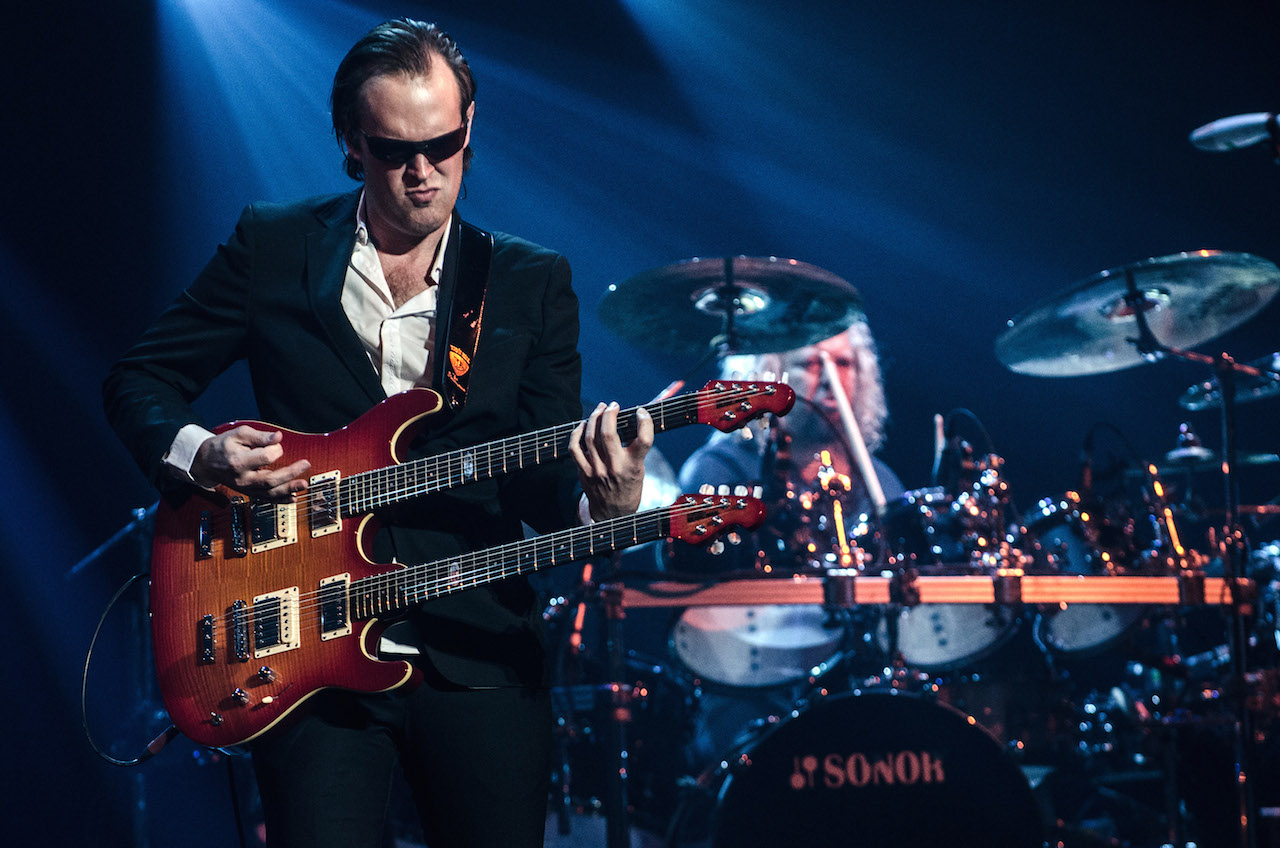
Enjoy him while he lasts, some say. There’s a theory that Bonamassa is firing out enough albums to secure his financial future, then he’ll retire to the trout farm.
That seems unlikely but, certainly, it feels like he’s in need of a break. First came the Grammys blast in 2011 (“I’m honestly so done with this bullshit!”). Then came last year’s tit-for-tat spat with Black Country’s de facto leader, Glenn Hughes. His graciousness and good humour has never slipped during an interview with this writer, but it’s only a semi-bombshell when he reveals there won’t be a studio solo album this year.
“I’m not slated to get back into the studio until January 2014,” he says, sounding relieved. “I think that 14 releases – between live and the studio – in a dozen years is enough. I think it’s good to take a break and recharge the creative batteries. I did that last summer, and the fact that I had two months off, and didn’t work as hard as I worked in the past decade, made the gigs more fun, less wound-up. I think this summer we’ll have the same luxury, just get out of the festival crowd and all that traffic, where every band in the world is touring. And we’ll just do spring and fall.”
A summer of domestic blues bliss at home with Sandi, then?
Bonamassa laughs: “Sandi and I don’t talk about music at home, at all. We have a strict policy of separation of church and state. I only heard Sandi’s record when it was finished. If things get mixed up like that, it won’t work, because to have parallel careers in the same profession, doing arguably the same thing, it’s gotta be deeper than that. Her and I are like best friends, and we talk very little about music. There’s no jam sessions at our place. The ‘power couple’ of the blues? I wouldn’t say that. I think it’s more Derek Trucks and Susan Tedeschi. They actually have a band together.”
Which bands are playing on the Bonamassa-Thom stereo?
“Y’know, I’ll tell you, I think the best band to come out in a very long time is The Black Keys,” he says. “To me, that stuff has changed the game, and I think the record [Dan Auerbach] produced for Dr John was just great. Some people do lo-fi for the sake of being cool, and maybe the hip rock magazines will pick it up, but, no, those guys, they walk the walk and talk the talk. One of the people that I really take a lot of arrangement ideas from – and people might be surprised at this – is Bruce Hornsby. The forgotten crooner, y’know? He’s like a musical nomad, and I take a lot of cues from him, because one day he’s doing a bluegrass record, next thing he’s got techno riffs, next day he’s putting out the best Americana stuff. He’s got musical ADD – just like I do.”
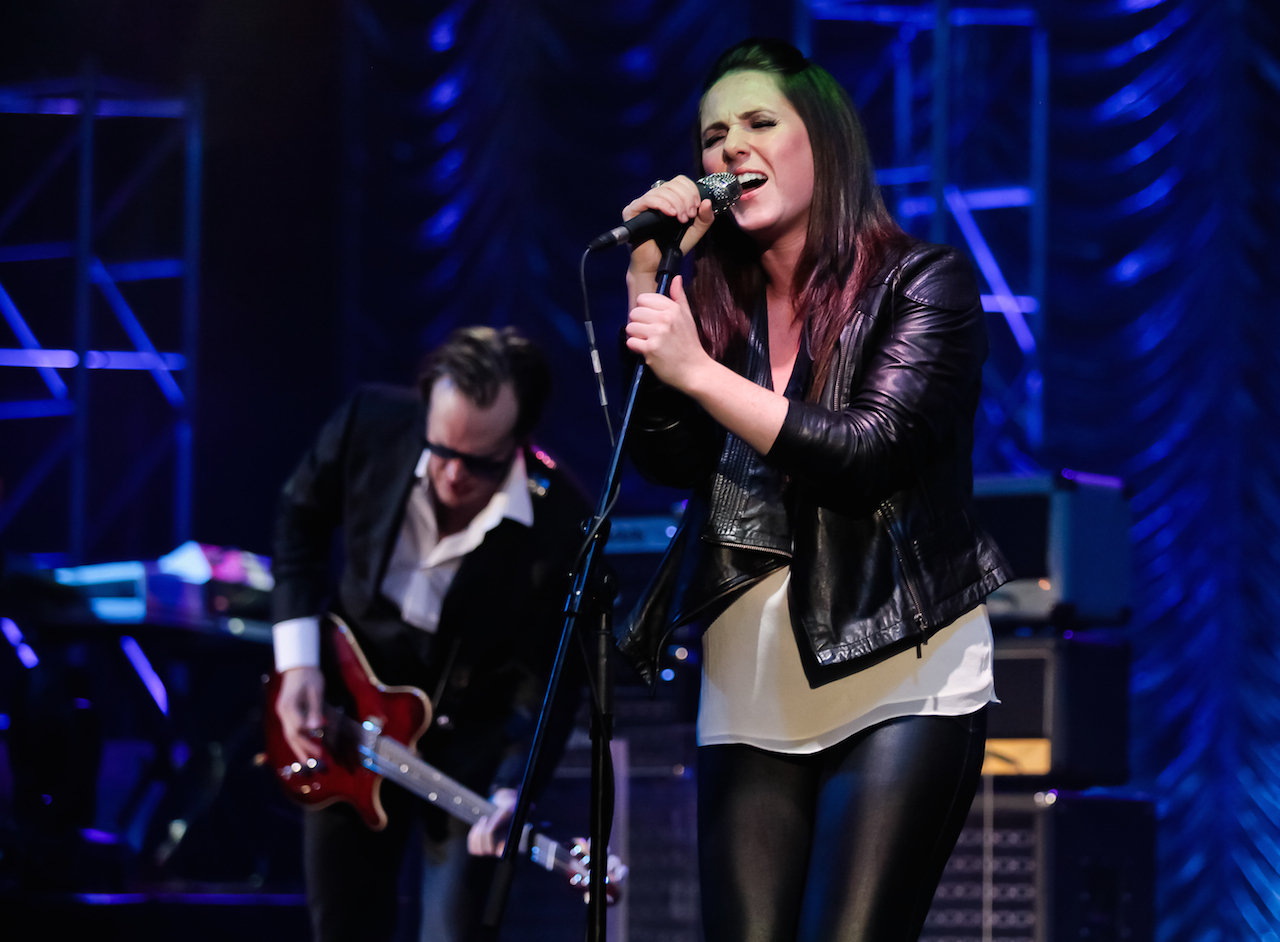
It’s not just musical. It’s easy to forget, as Bonamassa gabbles away like an old friend, that you’re in the presence of an arena-league superstar. His interview persona is the guitar-geek-done-good, and today he explains that the jut-jawed, Terminator-shaded figure of his electric shows is less a stab at cool, or an attempt to ‘hide himself’, as a practical necessity.
“I’ll tell you why that is,” he says. “I always wear sunglasses because I’m very light-sensitive. If there’s a bright light, I start to tear up, so imagine two 40,000-watt spotlights pointed at you, at all times. You know, it’d be like, ‘Why is he crying all the time?’ I wear sunglasses just because I see better, it’s less taxing on the eyes, plus, when I get tired, I get black circles, and it’s not very flattering.
Haven’t you ever had an obsessed fan?
“I mean, there’s been a few. There’s a few people that go a little bit far. There’s been a few that have harassed Sandi, but by and large… I mean, I talk to people at the venues, and, y’know, my tour manager always has the security guys there, and I go, ‘Listen, this is almost a joke’. I say, ‘Everybody is here to have a good time, they’re not here to tear the place up or tear me up’. I walk around the venue, I’ll walk around the streets, and you’ll run into people who are coming to the show and they’re like, ‘I’m surprised you don’t have somebody with you’. I’m going, ‘Nobody wants to punch me. I just play guitar. Nobody wants to hit me’. It would be pretentious. I’m not that big of a name. I don’t have three million Twitter followers like Kim Kardashian.”
Aren’t you starting to feel iconic?
“No!”
Have you ever used the expression ‘Don’t you know who I am?’
“No!” he protests. “Because people generally don’t. Never ask a question if you know the answer will be contrary to what you want to hear. Any sense of that Hollywood glitz and pomp and circumstance, or anything like that, I run from. But I will say this: I do not wear a backstage pass at my own shows. I have a driver’s licence that has my name on, if it comes down to that. That’s my only thing, that I don’t do. I don’t know if maybe it’s some kind of phobia I have, but I refuse to wear a dog-tag that has my name on it. It doesn’t make any sense.”
The fact is, 13 years since A New Day Yesterday, Bonamassa knows exactly who he is. And in case he ever needs reminding, he simply turns the tourbus towards Utica, upstate New York. “They haven’t made me a statue yet, no,” he laughs, “but I enjoy playing my hometown. I’m proud of being from Utica. My old high school friends have come to watch some shows, and I haven’t seen them for 20 years. They’ll come to me backstage and say, ‘We didn’t recognise you when you get onstage because you were always this shy person in high school, but we recognise you now, back here’. They’ll go, ‘You haven’t changed much’. And I’ll go, ‘No, my whole life is still guitars, amps and gigs’. It’s just, now I’m 35 and not 15.”
And how about your family: the folks who kick-started all this with that first cheap teenage guitar and the weekend vinyl sessions spinning Rory Gallagher, Eric Clapton and Paul Kossoff. They must be knocked out by your ascent?
“Yeah, my family is very supportive,” Bonamassa replies. “For all this hoopla that goes around, basically they’re pretty simple, middle-class folks. My father is really proud of me. He’s got a guitar shop and people drive up just to see him, because he’ll sit there and talk to you for an hour, and he sells bobble-heads.
“I remember when he called me up and said, ‘I’m calling the shop Bonamassa’s Guitars…’ and before I could get a word out, he goes, ‘Don’t say anything – I had the name first!’”
You sense that this approval – along with his own steely vision – is enough to dilute the venom and fuel Bonamassa’s formidable momentum. Whatever muck the hipster critics, blues purists, awards boards and forum trolls might throw his way, he knows he’s knocked his life out of the park. “I would not change a thing about the first 13 years of my career,” he states.
“I mean, there have been missteps and mistakes, mostly by me. Some records have been better than others. Some shows have been better than others. But you learn from it, and it’s all led me to this point.
“I mean, you know, I’m 35 years old, and I’ve put out a lot of records, and been in business all the time. I keep a positive mental attitude, even though the earth still rotates the sun every year and I have to put another digit on my age. So I still feel relatively young, and relatively new in this thing. And I think we’ve accomplished some stuff that, y’know, has made people take notice and say, ‘I can’t believe those guys pulled that off.’”
